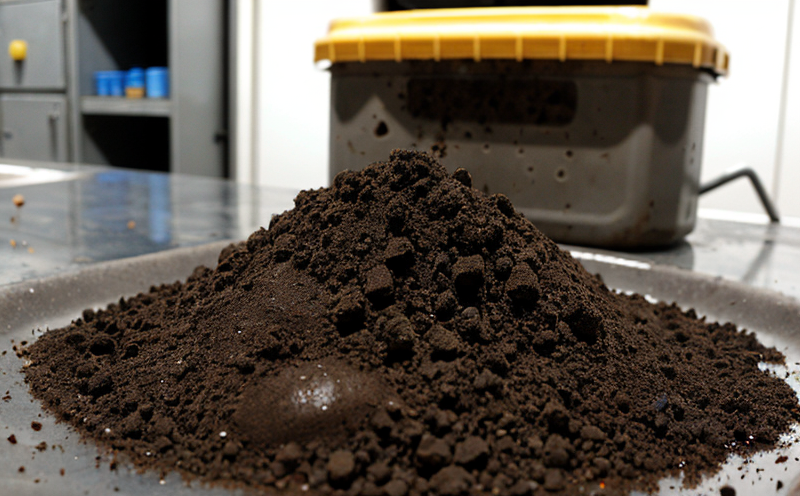Photovoltaic Material Residue Contaminant Analysis
The integrity and efficiency of photovoltaic materials are paramount in ensuring sustainable and reliable energy production. Ensuring that these materials remain free from harmful residues and contaminants is critical for both environmental protection and operational reliability. This service focuses on the thorough analysis of potential residues and contaminants within photovoltaic materials, providing insights into their purity levels to support quality control, compliance with international standards, and continuous improvement in material performance.
The process involves a comprehensive evaluation using advanced analytical techniques that can detect even trace amounts of impurities or unwanted substances. This service is designed for various stakeholders including quality managers, compliance officers, R&D engineers, and procurement teams who need to ensure the highest quality photovoltaic materials are used in their processes.
Our laboratory adheres strictly to international standards such as ISO 9001:2015 and ISO/IEC 17025 for calibration and competence. This ensures that our analyses meet the highest industry benchmarks, providing reliable data that can be trusted by all parties involved in photovoltaic material production and usage.
The first step in this process is a detailed review of the raw materials used to manufacture photovoltaic cells. This involves examining the chemical composition at both macroscopic and microscopic levels. Next, we conduct a series of tests using state-of-the-art equipment tailored specifically for identifying residues and contaminants such as heavy metals, organic compounds, and other potential impurities.
Once identified, these residues are quantified according to their concentration within the sample. This allows us to determine if they fall outside acceptable limits set by regulatory bodies or internal specifications. If necessary, we also provide recommendations for mitigating any issues found during our analysis.
The importance of this service cannot be overstated given its role in maintaining high standards across the photovoltaic industry. By offering accurate and reliable residue contaminant analyses, we help ensure that only the purest materials are used in manufacturing processes, thereby enhancing overall product quality and performance.
Our approach ensures not only compliance with international standards but also contributes towards environmental sustainability by preventing harmful substances from entering the supply chain or end products. This commitment to excellence reflects our dedication to supporting responsible practices within the photovoltaic sector.
Scope and Methodology
The scope of this service encompasses a wide range of analytical procedures aimed at detecting and quantifying residues and contaminants in photovoltaic materials. The methodologies employed are designed to be versatile enough to cater to different types of samples while maintaining precision and accuracy throughout the entire process.
For solid-state samples like silicon wafers, we utilize techniques such as Inductively Coupled Plasma Mass Spectrometry (ICP-MS) for heavy metal analysis and Fourier Transform Infrared Spectroscopy (FTIR) to identify organic compounds. Liquid-based materials are analyzed using High Performance Liquid Chromatography (HPLC), while gaseous samples may require Gas Chromatography-Mass Spectrometry (GC-MS).
Each sample undergoes rigorous preparation steps prior to analysis, ensuring that they are representative of the original material. This includes cleaning procedures tailored specifically for photovoltaic components followed by precise cutting or dissolution processes depending on the nature of the sample.
The results obtained from these analyses provide detailed information about any residues present in the materials along with their concentrations. These findings form the basis upon which decisions regarding further processing, quality assurance measures, and potential corrective actions can be made.
Our team of experts works closely with clients to understand specific requirements and preferences before recommending appropriate testing strategies. This collaborative approach ensures that all aspects relevant to each unique project are addressed comprehensively during the analysis phase.
Industry Applications
The need for residue and contaminant analysis in photovoltaic materials extends beyond just compliance with regulatory requirements; it plays a crucial role in several key areas across the industry:
- Quality Control: Ensuring that every batch of raw material meets stringent quality standards is essential for maintaining consistent performance throughout production lines.
- Environmental Compliance: By adhering to strict limits on harmful substances, manufacturers can avoid legal penalties and contribute positively to environmental conservation efforts.
- Innovation: Continuous improvement in photovoltaic technology relies heavily on understanding how residues affect material properties. This knowledge drives innovation towards developing more efficient cells with longer lifespans.
- Supply Chain Integrity: Establishing trust within supply chains through transparent testing processes helps build strong relationships between suppliers and buyers alike.
Our services play a vital role in these applications by providing precise, reliable data that can be used to make informed decisions at every stage of photovoltaic material development and manufacturing.
Customer Impact and Satisfaction
In the world of photovoltaics, where even small deviations from purity levels can lead to significant differences in cell efficiency or lifespan, our residue contaminant analysis service has proven invaluable. Here’s how it impacts customers:
- Enhanced Product Quality: With accurate identification and removal of contaminants, we help ensure that only the highest quality photovoltaic materials reach end users.
- Increased Efficiency: By eliminating impurities early in the production process, there is less risk of costly rework or scrapped products further down the line.
- Cost Savings: Early detection and correction of issues can prevent expensive mistakes later on, ultimately reducing overall operational costs for clients.
- Better Decision Making: Armed with detailed analytical reports, our customers have more confidence in their choices regarding material selection and process optimization.
We pride ourselves on delivering top-tier service that exceeds expectations. Our dedication to excellence has earned us a reputation as trusted partners among many leading companies in the photovoltaic industry. Whether you're looking for compliance solutions or cutting-edge research support, we have the expertise and resources necessary to meet your needs.





